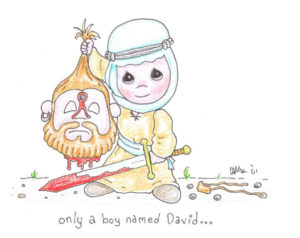
Photo by Ronaldo de Oliveira on Unsplash
Kraft Dinner is an abomination. If you don’t think so, it’s because you’ve fallen victim to a lie, one that demeans both you and cheese.
I used to eat KD. When we first moved off campus, my college roommates and I ate it a lot. The convenience of the stuff eclipsed all other considerations—taste for instance. We did eventually tire of it, so we attempted to gussy it up a little by adding a dollop of mustard or diced onions. If it was a special meal, we’d add cut up hot dogs. These attempts did not really redeem the meal because the core element didn’t change; it was still Kraft Dinner.
I haven’t eaten KD for over 30 years. The reason is that I like cheese. Why would I eat a powdered cheese when I can eat real cheese?
[click_to_tweet tweet=”Kraft Dinner is evidence that human beings are willing to exchange great pleasure for a degraded experience in the worship of any number of false idols. #kraftdinner #premaritalsex #monogamy #marriage ” quote=”Kraft Dinner is evidence that human beings are willing to exchange great pleasure for a degraded experience in the worship of any number of false idols. #kraftdinner #premaritalsex #monogamy #marriage “]
Degraded Pleasures
Obviously, human beings can be manipulated to exchange great pleasure for degraded experiences.
As evidence, I give you
- Hostess Twinkies–over 500 million degraded pastries sold each year,
- M&Ms–over 400 million degraded chocolate candies produced each day,
- Folger’s Coffee–degraded coffee sold for less than $7 for a two pound can,
- Coor’s Lite–over 100 million cases of degraded beer,
- and Kraft Dinner.
There are 7 million Kraft Dinners sold per week. Canadians eat an average of 3.2 boxes each year. What can explain these disturbing numbers?
Minions of hell, of course.
C. S. Lewis gives us an imaginative explanation as he explores the hellish view of pleasure in The Screwtape Letters. An experienced tempter, Screwtape, offers advice to his nephew, a novice, on the uses of pleasure to ensnare a human soul. Screwtape laments that despite their best efforts, Hell has not been able to produce a single pleasure, but pleasure can still be useful if properly degraded. He tells his nephew,
You must always try to work away from the natural condition of any pleasure, to that in which it is least natural, least redolent of its Maker, and least pleasurable
for when dealing with any pleasure in its
healthy and normal and satisfying form we are, in a sense, on the Enemy’s ground.
Let’s use beer as an example of how the demonic is at work in degrading pleasures.
Beer is a pleasure–a good gift from God. One of the best beers I ever had was in Rennes, France. The label said it was Picon Biere and it tasted like oranges. I was sitting outdoors in the warm sun at around 3 o’clock in the afternoon. I had nowhere to go and nothing to do. The street was cobbled. Across the street was a row of 16th-century buildings. It was one of those incredible moments of joy. I think this experience was close to what God had in mind when he invented hops and barley and yeast.
There is a lot of beer consumed in a way that offers nothing like the pleasure of a pint from your local microbrewery. The mass-produced lagers are the beer of choice for those who want to want to express their freedom through the “fun” afforded by alcohol. They don’t drink one or even two, but many of these cheap beers. The taste of each individual beer is unremarkable, so they are not really enjoyed and the cumulative effect is far from the pleasurable, particularly the next day.
This is how the devils take a good gift from God and suck most of the pleasure out of it. The same is done to the pleasures of sex.
Kraft Dinner and Sex
There’s KD sex, and there’s sex the way it was meant to be. Many people reject the Christian ideal of sex within marriage because it is too restrictive. All good things have limits. Just as you can’t make a good tasting cup of coffee with Robusta beans, you can’t experience all the pleasures of sex outside of marriage.
[click_to_tweet tweet=”All good things have limits. Just as you can’t make a good cup of coffee with Robusta beans, you can’t experience all the pleasures of sex outside of marriage. #kraftdinner #premaritalsex #monogamy #marriage” quote=”All good things have limits. Just as you can’t make a good cup of coffee with Robusta beans, you can’t experience all the pleasures of sex outside of marriage. “]
In his book, Orthodoxy, C. K. Chesterton is puzzled by “the common murmur . . . against monogamy.” Baffled he asks why people would gripe over the restriction of “keeping to one woman” and overlook the privilege of being able to love even one.
I heard of a conversation in which some young people were having an honest discussion about marriage and sex with an older Christian. One of the young people asked the adult, “How does it take . . . how long does it take to make love.” The wise answer was, “Years.”
Is Biblical morality really opposed to pleasure?
Is one Picon Biere really inferior to a dozen Coors Lights?
Is the long love to one marriage partner really inferior to many short-term relationships?
[click_to_tweet tweet=”Biblical morality is opposed to pleasure if one craft beer is inferior to a dozen Coors Lights, if long love to one marriage partner inferior to multiple, short-term relationships. #kraftdinner #premaritalsex #monogamy #marriage ” quote=”Biblical morality is opposed to pleasure if one craft beer is inferior to a dozen Coors Lights, if long love to one marriage partner inferior to multiple, short-term relationships. “]
Seafood Mac and Cheese
The ingredients for Seafood Macaroni and Cheese are:
- olive oil
- large shrimp
- chopped onion
- chopped peeled carrots
- chopped celery
- garlic cloves, peeled, flattened
- Turkish bay leaf
- tomato paste
- Cognac or brandy
- butter
- flour
- whipping cream
- Fontina cheese
- gemelli pasta
- fresh crabmeat
- chopped fresh chives
These, properly blended and prepared, have echoes of heaven.



 I love these
I love these